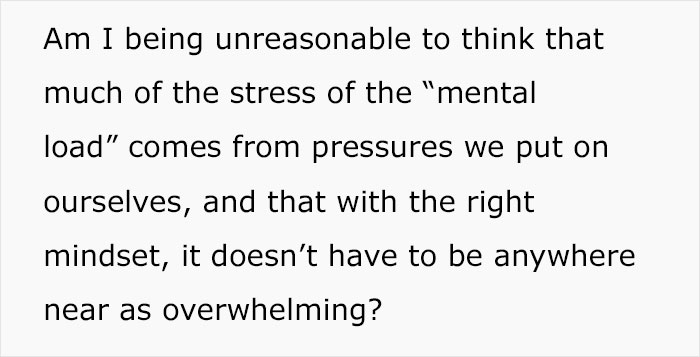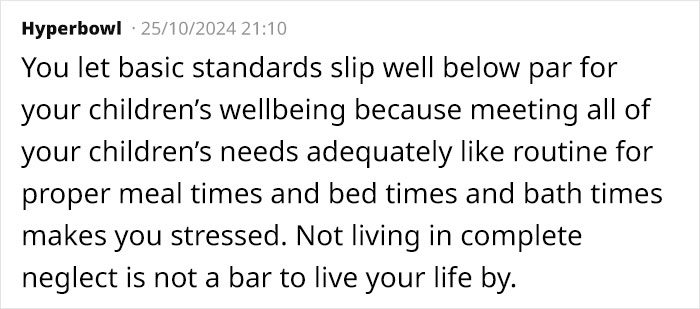You can feel exhausted even without exerting yourself physically. The mental weight you’re carrying can be just as heavy, if not more.
However, a dad who is known on the parenting forum Mumsnet as Whatnow123 doubts the extent to which this is true for his wife.
In his candid post, the man shared his experience of taking on the majority of their household responsibilities and how he was starting to think that a lot of the “mental load” that his spouse talks about could be self-imposed.
After this man’s wife took a lucrative job offer, he picked up the majority of their chores

And started to question what the big deal was








Mental load impacts everything from our productivity to our relationships
“Mental load” (sometimes also called “worry work” or “cognitive labor”) is not about the physical tasks but rather the overseeing of those tasks. It’s about being the one in charge of the never-ending list of to-do items constantly running in your head, remembering what needs to get done and when, delegating all the tasks to other family members, and making sure they actually follow through.
A study published in the American Sociological Review, for example, describes it as the responsibility of “anticipating needs, identifying options for filling them, making decisions, and monitoring progress.”
According to Lucia Ciciolla, Ph.D., a psychologist at Oklahoma State University who has researched the impacts of invisible labor on mothers, in addition to sapping time and energy, it is also often taken for granted.
“I think it has become a topic of discussion in recent years in part because men are contributing more to the care of children and the household, and even though women may be physically doing fewer loads of laundry, women are realizing that they continue to hold the responsibility for making sure it gets done—that the detergent doesn’t run out, that all of the dirty clothes make it into the wash, that there are always clean towels available, and that the kids have clean socks,” Ciciolla explains. “Women are recognizing that they still hold the mental burden of the household even if others share in the physical work, and that mental burden takes a toll.”
However, people do handle stress differently

Image credits: yanalya / Freepik (not the actual photo)
Elizabeth Scott, PhD, has over two decades of experience educating and working with others on issues related to stress, emotional well-being, health, relationships, and overall life satisfaction. She is the author of 8 Keys to Stress Management and says that any situation is basically neutral until you interpret it. Because of that, stress is a highly subjective experience.
“Some people are naturally more sensitive and reactive to stress,” she writes. “Differences in temperament and a collection of inborn personality traits can cause some people to be naturally more resilient in the face of stress while others can feel more threatened and less able to cope.”
Scott acknowledges that accepting another perspective can be tough. But it’s not like we can’t do anything about it.
“While we can’t change the temperament we were born with, we can become more aware of our predispositions and work around them by building up skills that may compensate for certain sensitivities, or structure our lifestyles to minimize the impact of triggers.”
The reactions to the story were split, with some people disagreeing with the man









And some supporting his claims












